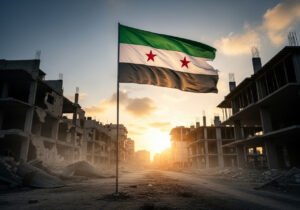In our lives, hardship and pain are unavoidable. When we face our own suffering or see others’ pain, we can easily fall into what sociologist Brené Brown calls “comparative suffering.” This is the tendency to rank pain. We believe our suffering is either “more” or “less” significant than someone else’s. We might downplay our own pain because “someone else has it worse.” Or we might exaggerate our suffering to justify our feelings or seek special treatment. As Brown highlights, this mindset is unproductive and damaging. It comes from fear and scarcity, a false belief that empathy is limited. It also stops us from truly acknowledging our own feelings or showing genuine empathy. When we ignore our feelings or judge someone else’s pain, connection and kindness are lost. But what happens when this individual habit becomes a widespread issue in a conflict-torn society?
Understanding Comparative Suffering
The devastating conflict in Syria, marked by years of oppressive rule under the Assad regime, offers a powerful and tragic example. It shows how comparative suffering can appear on a large scale, causing more harm in an already traumatized society. While the conflict caused widespread suffering, its nature and intensity varied greatly among different groups.
There were those who endured torture, imprisonment, or lost loved ones due to bombings, chemical attacks, or illegal killings. Millions had to flee their homes, becoming internally displaced or refugees.
Obstacles to Healing
In the wake of such a complex and devastating situation, comparative suffering greatly hinders healing and reconciliation. It often creates a hierarchy of suffering. Here, some groups’ experiences are seen as “more valid” or “more deserving” than others. This can lead to minimizing others’ suffering. This might be driven by a desire to assert one’s own pain or to compete for limited resources like aid, international attention, or political power.
Unfortunately, social media can amplify this dynamic. Individuals may use these platforms to magnify their own suffering in a way that minimizes or dismisses others’ pain. In a context of scarcity, groups may feel the need to prove their suffering is “the most important” to secure resources or recognition. Some groups, feeling their suffering is underrepresented, might even use this to justify more violence or conflict.
The Grave Consequences
Comparative suffering in Syria has grave consequences. When individuals or groups feel their suffering is minimized or ignored, it can re-traumatize them. It deepens their sense of injustice. Comparative suffering creates divisions and distrust between different groups. This makes it incredibly difficult to build peace and foster reconciliation. Furthermore, individuals cannot fully recover from their traumas if they feel they must constantly defend or justify their pain. Ultimately, unresolved grievances and competition for recognition can lead to continued conflict and instability, potentially causing more violence.
Addressing Comparative Suffering
Addressing comparative suffering is essential for Syria’s path to healing and a more just future. Drawing on Brené Brown’s work, we see the importance of acknowledging the universality of pain. Suffering is a fundamental human experience, despite its varied forms. Everyone affected by the conflict deserves recognition and support, regardless of their specific experience. This reflects Brown’s emphasis on validating our own feelings and acknowledging the validity of others’ pain.
Promoting empathy and active listening is also crucial. Create spaces for individuals from different groups to share their stories. They can listen to one another without judgment. This can help break down stereotypes and build understanding. It is much like Brown’s emphasis on practicing empathy without comparison. While acknowledging differences in experiences, focus on the common threads of loss, trauma, and resilience that unite many Syrians.
Ensure that aid, rehabilitation, and justice mechanisms are trauma-informed. This recognizes the long-term psychological impact of the conflict on individuals and communities. Encourage responsible and ethical use of social media. This can foster empathy and understanding instead of competition and division. Finally, ensure aid is distributed properly and fairly. This will help avoid the feeling that some groups are getting more assistance than others.
As Brené Brown argues for overcoming comparative suffering individually, the Syrian context shows the urgent need to address it societally. Overcoming this tendency is crucial for fostering healing, reconciliation, and a more just and peaceful future for all Syrians. It requires conscious effort to validate everyone’s pain, promote empathy, and build bridges of understanding across different communities. By moving away from ranking suffering and towards shared humanity and compassion, Syria can begin to mend the deep wounds of conflict and build a more hopeful future.




